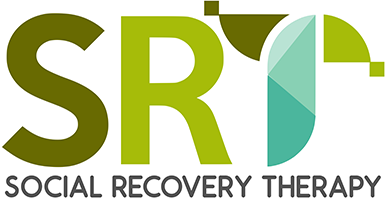SRT Multisystemic Work
SRT Multisystemic Work…Social disability is usually rooted in a lifestyle of social withdrawal in which various complex maintenance factors are present. For example, it can happen that well-meaning family members may inadvertently encourage with the person’s avoidance by adopting an over-protective role. Powerful mental health professionals may discourage the person from engaging in new activities, due to concerns that this may cause stress and trigger relapse.
In many cases, improving social recovery through SRT Multisystemic Work may require incorporating the role of what would typically be expected of a more traditional care co-ordinator, key worker or case manager. Addressing attitudes of the social network and with professionals, both mental health staff and educational or employment representatives, may be part of this work.
As SRT aims to engage young people in structured activity, the intervention can often include supporting them to access employment, education, training, voluntary and leisure opportunities. All potential opportunities are explored collaboratively with the individual and enrolling in activities is informed by readiness to change. It is recognised that SRT therapists are not necessarily vocational experts so developing good links and relationships with local vocational, education and voluntary agencies is recommended. The person may feel much more confident about, for example, resuming education or joining a new course if they feel adequately supported by an understanding educational provider.
Using meetings to introduce individuals to other organisations can create excellent opportunities for SRT behavioural experiments. Exploring opportunities to engage in meaningful activities is integrated within the general therapeutic work, alongside increasing motivation, hope and a sense of agency. Therapists skilfully work to develop and support a social recovery promoting system around the person.
SRT Multisystemic Work strategies include:
1. Sharing SRT formulations with the individual’s social network –
- Increasing the network’s understanding of problems and enabling the network to support social recovery interventions.
2. Working with the social network –
- Reducing maintaining behaviours such as over-protective parenting or addressing language and attitudes which may be detrimental.
3. Addressing maintaining factors in the wider system –
- Lack of funding, inadequate housing and other factors may present barriers to engagement in meaningful activity.
4. Discussing and managing risk issues alongside mental health teams –
- Sharing learning and plans with other professionals to maximise the interventions success.
Vocational interventions include:
1. Working with schools and colleges –
- Supporting and enabling organisations to provide what the individual needs to start or maintain engagement in structured activity.
- Acting as a link between the individual and vocational organisation representatives.
- Sharing formulations and treatment plans collaboratively between the individual and vocational organisations representatives.
- Arranging and attending meetings with vocational organisations.
- Providing psychoeducation and support to upskill employment and education providers.
2. Supporting individuals to access and maintain work opportunities –
- Going with individuals to their place of work.
- Supporting individual to complete application form and providing references.
- Reviewing progress with individuals in activities with which they are engaged.
- Setting between session tasks for individuals to research opportunities within which they might like to engage.
- Using role play to support individuals in interview preparation.
- Making initial contact with organisations.
- Arranging and supporting work, education or voluntary experience opportunities through attending with individuals and framing this as behavioural activation, exposure or experiments.

